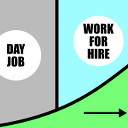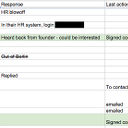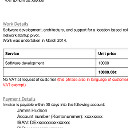










Perhaps you wake up on Monday, and can't wait to get to the office, or lab, or bar, or studio, or building site. You are crafting an exciting project with a group of talented people - your friends. You're proud to tell people where you work, what you are working on, and what you have done. Perhaps you live in a Nordic country which has a culture which gives more respect to employees than corporations. That's fantastic. I'm not writing this for you, so maybe go and read something interesting on Wikipedia instead.
I'm writing this for you if you feel that your options in life will always be bracketed by the pay scales, work hours, and the responsibilities that you have been allotted. If you just want to say "no" to your boss sometimes. If you want to devote more time to learning your trade, or working hard on good projects that you care about, or staying in bed with your significant other until midday on a Thursday. If you want to grow to fill the potential you were born with, I'm writing this for you.
Probably - just skim if you want. However, I'm not going to give you a warm fuzzy feeling for 15 minutes by telling you that your dreams are lovely, that you should chase them and make a million dollars. I'm going to tell you that 95% of your ideas probably suck, and the only reliable way to be rich is to have rich parents. I'm almost pathologically cynical after being bumped around by life for 33 years, but maybe I can help you eke out some extra freedom and happiness in this brutal and indifferent world.
I've enjoyed the benefits of my self-made lifestyle for almost two years, and I think I'm onto a good thing. I'm serving the world better by being able to more efficiently deploy my time and abilities. But it's lonely on the outskirts of society. I want you to join me here; there's enough richness here for all of us, and perhaps we can work together to build an even better place out here together.
This is a step-by-step guide to starting your own "lightweight" business (with minimal startup and running costs) and becoming financially independent. After about 18 months, my intellectual property already pays my living costs, so when I work, it's for fun, or for something I believe in. I think it's also wise to work for savings, since I can't rely on the State or an employer to look after me anymore (and nobody should, although that's a story for another time). I live in Berlin, which has some unique positives and negatives for a freelancer, but the general concept should work anywhere.
No way. In many ways I live more like a student than when I was a student. I haven't made millions of dollars. I don't own my own property (but I live in a beautiful house). I don't have children. I have sacrificed my material living standards. However, I almost literally do whatever I want. If I have the skills, that is; I will never dance Swan Lake with the State Ballet. However, I now have the time to improve those skills, to get better at making other people money (which means more money for me), or better at dancing or flexibility, or whatever else is lacking in my life.
Other than that, in the last two years I've had the breathing space to open my world to new opportunities: I've read every single George Orwell book, build an app for my mother's birthday, trained hard at dancing and then taught in a poledance school in the Swiss Alps, helped businesses and artists move into new fields of technology, learnt new programming languages, danced on stage around Europe, and taken part in art exhibitions. I made a singing cat app with some friends, just because we thought it would be funny.
Sometimes I'll program for 8 hours in an office; it is nice to have a stable, productive environment with talented people. Occasionally I'll take my laptop to the forest and write code with the birds and the hedgehogs and the wind rustling in the trees. Sometimes I'll work all night, fuelled by coffee, inspiration, or an impending deadline. Sometimes I'll stay in bed all day and watch YouTube documentaries.
I might delete this post in the future out of shame, if I end up back in an office job. These ideas could be a disaster for you. I'll be first to admit I'm a bit odd, and my lifestyle might be intolerable for most people. I've managed to keep myself relatively free of responsibilities for a 33-year-old. But I can show you that the everyday nine-to-five (or six, or ten) isn't the only deal out there.
I'm going to break my ideas down into elements. They stand on their own, but they should all contribute towards financial independence and wellbeing. Are these based on empirical evidence? No. These are my observations based on my life and those who have taken a similar route. If you think I'm talking rubbish, let me know. If you want to see statistics and peer-reviewed papers, let me know and I'll try and dig them up in the future.
I have covered a whole spectrum of emotions in the last two years: I've had these sort of thoughts in equal measure: "It feels GREAT to wake up to morning dance training in the middle of the week. And to think I can do this every day, for the rest of my life! I think I'll just walk around Berlin all day and enjoy the sunshine". At the other extreme is: "If I have to show my tax advisor these same pitiful earnings next year, I'm going to be so ashamed I'll ask for my old job back". Now my situation has stabilised into a workable and sustainable lifestyle, which is better by any measure than my previous one.
Unfortunately, our monkey brains are wired to chase happiness, not to be happy, and eventually even a dream lifestyle becomes "business as usual". The honeymoon period of any favourable life situation seems to be about three months. I spent about that long, alternately: dancing all night because I could, panicking over the German bureaucracy and costs of running a business there, skipping through the streets bouyed by an overwhelming sense of freedom, and waking up in a cold sweat convinced I'd made a stupid decision.
The artist Michelangelo Buonarroti was one of the most highly regarded geniuses of his era, and he was still plagued by proposal writing, submitting to the aesthetic whims of "difficult customers", chasing down accounts receivable, and avoiding political intrigues. The typical life of a freelancer.
However, at least I have control over my life. I have the flexibility to look after my relationships and health properly, and I can avoid many situations that are unfulfilling or unproductive.
Finland, three years ago. As the Finnish autumn colours faded into months of bitter gloom and cold, my mood also darkened. Back in Australia I had built robots and worked with artists on multimedia projects as a freelancer. I had started a company with an old friend, and gestated our Wii game for a year. We had nurtured our "mother" company, Nocturnal Entertainment, which had in turn cared for us. We paid great developers for fantastic work. That was all ancient history. I'd come out of a crushing breakup, ran as far from Australia as I could, and gone back to a day job. My self-confidence meter was only just creeping back from zero, and winter was on its way to smash me down again. I worked with good people in a great company, but I felt uncomfortable in my life, as if it was a jacket which was too tight. At which point had I fallen asleep and started sleepwalking through life?
When I'd arrived in Finland a year previously, a friend had told me about an interesting talk by a French woman, who was doing performances with internet content. I took her card and it became buried in my desk drawer for a year. Looking for a bridge back to my exciting old days building robots and artworks, I exhumed her business card and wrote a quick email:
"I have holidays coming up, and some free time. I was wondering if you were still interested in working on the software?"
She was. I rode my bike from Berlin to Amsterdam, then caught the train to Paris. We built the first version of our software over a week: baguettes, wine, cheese, and coffee in at one end; C++ code out the other. A couple of years later, this fun spare time project was taking more and more of my attention, until it was leaving me no spare time. I had to make time in my life somewhere. It was conceivable that there were similar projects out there, and that they could support me. I quit my job.
A bit of money started sputtering in. Not enough. I could have taken more time to build connections and find customers before I left my job, but this would have been unfair on my employer at the time. I was emphatic about doing all my sales work for them until I left, not for myself.
Stepping outside the cosy routine that society had built for me was like stepping from a comfortable house with a roaring fire into a wild storm, with animals rustling and growling in the shadows. What if nobody needed my style of software? With a job, I was a respectable member of society. Without one, I was one contract away from being a bum. I told myself I'd give it a year to see how it worked out, and then go back to Australia.
It's 18 months later, and I'm still outside the cosy house. The storm is actually exciting, the wild animals are just friendly puppies, and the house looks slightly prison-like from the outside. It's working well enough that I now have enough spare resources to help other people have a look outside, too.
What are you passionate about? Do you have a fantasy, an idea that you would like to make happen? Share that excitement. Look up your heroes online and talk to them about it. Ask your friends if they want to do some fun little project in their spare time with you.
Ten years ago I was at University, and was looking for a summer internship. I emailed Doctor Karl, an Australian TV celebrity scientist, and asked where I could go to build robots. He wrote back and gave me some contacts, and I ended up working at the Australian Centre for Field Robotics.
Maybe your idea is dumb. If you have a dumb idea, you will write to strangers and you will get no reply. If you have a good idea, strangers will write back, even just to tell you it's a dumb idea. Even a rejection means they thought the idea was worthy of a response.
Some of my customers tell me that they can't even find a software developer to do a bad job for too much money. Where are are all the developers? Living off the money they saved before they quit their well-paying IT jobs, and working on their dream "startups" which will probably go nowhere. Meanwhile, urgent, useful work that the world really needs is lying neglected. I won't tell you how to follow this path, because it is easy: work on whatever you find fun, blow all your time and money on something the world doesn't care about, then go back to your day job when your money is exhausted.
If it's a dumb idea, you will need to pay to make it happen. If the world needs your idea, it will pay for it. You should never have to pay to get your idea off the ground. There is a whole "vanity press" industry which thrives on charging wannabe-writers to do a print run of their books. These printing runs generally have two sales: the author and their mother. If your book is worthy, publishers will pay you for it, or it will get noticed online and people will buy it, without you spending any of your own money. Don't become a victim of your vanity, either by paying for personal validation, or wasting precious time on projects that the world just doesn't need or care about.
The minute you realise you are throwing your time and money into a black hole, drop that idea. If the world greets your idea with silence, let the idea go. You can always come back to it later when you have less important things to do.
You hear stories of authors or developers making hundreds of pitches and then eventually having the one lucky break which is a runaway success. Don't listen to these stories; those people won the lottery. You never hear the stories of the countless others who never got a publishing deal or whose startup went nowhere. Don't gamble with your life: take the safe options first which let you survive. Take cash upfront at first. Then you will have time and energy for the more risky endeavours which may or may not pay off.
The goal here is to leave yourself open to opportunities, but to quickly drop any that show signs of taking too much time for no reward. Wait until you have the resources, contacts and experience for a moon-shot.
Once you have a few customers and a stable income, you can fill the downtime with speculative projects. Have lots of projects running at once. Whenever you find yourself with nothing to do, start a new one. Whenever I have nothing better to do (i.e. no paid work), I will work on a new app for a maximum of 2 days, then put it up in the store. If it doesn't get many downloads, I don't bother writing an update for it unless I have absolutely nothing better to do. One app I made, the Hands-Free Browser, pays most of my rent. All the others put together barely pay for my coffee. Maybe a few of your ideas will pay all your bills in the future. The important thing is to just keep planting seeds: keep writing to random businesses (this will definitely be the subject of a future blog post), keep talking to new people, keep starting new projects and collaborations. If a seed seems dead after a few tries of watering it, just give up and ignore it. You never know when it might unexpectedly spring back to life.
I'll try writing this blog for a while. If nobody reads it and I get zero feedback, I'll take it as a sign that it's a dumb idea. I'll give it up as a lost cause and move onto something else more productive. If I get enough feedback (please write!) or Facebook activity, you can bet the second blog post will be prettier and better-researched, and better targeted to whoever is interested. You'll notice that I haven't spent much time on layout. I've only sunk a few hours into it, so it's no great loss if it goes nowhere. But it's another seed I've planted.
James Hudson
Needless to say, this blog isn't financial or legal advice, an excuse for getting fired, or promising that any of these ideas will work for you. The companies or people I mention may not agree with my opinions here. Don't do anything reckless, damaging or hurtful to anyone! In the future you might need your bridges unburnt.